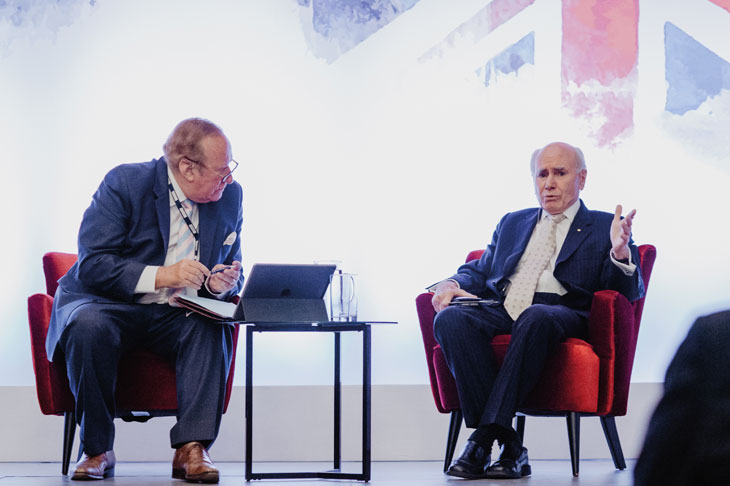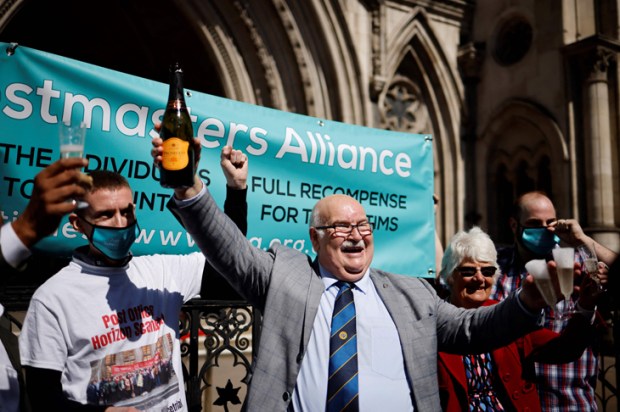As a new wave of protectionism sweeps across the globe, can Britain and Australia lead a free trade fightback? What will Brexit mean for Anglo-Australian relations? And what can Britain learn from Australia about life and trade outside the EU? In a forum at the Australian High Commission, The Spectator brought together six high-profile guests to answer these questions, chaired by The Spectator’s chairman, Andrew Neil.
A sister forum, also chaired by Andrew Neil, is to be held in Sydney on Friday, September 7, at Pier One, with a distinguished line-up including a keynote speech by Tony Abbott.
While many in the UK are worried about the way in which Brexit negotiations are going, Australia, with its historically close links to the UK, is eagerly awaiting Britain’s departure from the EU. Since joining the EEC, Britain has neglected Australia in bilateral trade.
John Howard was one of the keynote speakers. As well as initially supporting Brexit, where ‘sovereignty and independence [were] overwhelmingly the most important reasons’, Mr Howard said, ‘I’m not sure you can have a “full Brexit” if you are still part of a customs union.’
Leaving the customs union would give Britain the vitally important ability to negotiate its own trade deals, away from EU protections that leave Australia out in the cold. Sir Lynton Crosby drew the dots between Brexit and free trade. ‘There’s a bit of a populist narrative developing that somehow people are moving against free trade. We shouldn’t necessarily assume that is so just because some politicians in some places are saying particular things at a point in time. In the Brexit referendum, people wanted the sense that Britain can make its own way in the world. So I take a different view to Brexit than most. I think it was a view to embrace the world, not to retreat from it.’
With this in mind, George Brandis, the Australian High Commissioner to the UK, made his bid for Australia as one of Britain’s future trading partners. Emphasising the close links between the two countries, Mr Brandis was of the opinion that ‘our current trading and investment relationship forms an excellent basis for which to achieve free trade, to raise productivity, and to create more jobs in both countries. And quite aside from the economic benefit, a free trade agreement will announce the arrival of the UK as a modern, major, global trading nation in its own right. Surely one of the principal outcomes which Brexit should achieve for this country… I am confident that we can sign an ambitious, high-quality FTA quite soon after Brexit. As Prime Minister Turnbull said, Australians are fleet of foot, we don’t muck around. We will move as soon as Britain is more fully able to enter into a free trade agreement.’
So what does such a high quality, ambitious FTA look like? Mr Brandis gave a view of what it won’t be. A worry amongst the British side in free trade with Australia is the latter’s flourishing lamb and beef industry, that free trade would allow a tsunami dumping of the meats into the UK market and flood out British farmers. Mr Brandis disagreed: ‘Nothing could be further from the truth. In fact, Australia can’t even supply the hungry middle-classes of Asia fast enough, with our agricultural products.’
Dan Hannan picked on one important area that the FTA should cover. ‘The difference between how the EU goes about trade, or indeed how the Obama administration went about trade deals, is that they tended to look for common standards. The harmonisation of regulation. A much more open and liberal approach is to say, we trust you, you’re a proper country, we assume that you don’t want to sell mineral water that poisons your people. And therefore, whatever you say is mineral, that’s fine. Mutual product recognition.’
Elizabeth Ames, the Executive Director of the Australia UK Chamber of Commerce, pointed out that Australian medical degrees are not automatically recognised in the UK; in fact, qualified doctors in Australia must requalify in the UK, which takes a year. ‘You already have Australian lawyers recognised in London. You have lots of Australian bankers here already. What you could have is a system that sees Australian medical degrees recognised in the UK.’
As Andrew Neil suggested, this opens up an interesting avenue by which to negotiate an FTA. ‘That would seem to be quite a relatively easy hit on reciprocity; that we’d identify to begin with, say, a series of professional qualifications and offer mutual recognition.’
For multinational firms relying on highly skilled labour, such as (sponsors of the UK Forum) Rio Tinto, increased mobility in labour between the two countries would also be welcomed. JS Jacques, CEO of Rio Tinto, talked about the drive into automation. ‘For us, technology is essential. We need to have access to more talents in the engineering space and data science, and we can’t find those people globally, and definitely not in Australia. So if there is a strong pool of talent in the UK, we will be very, very interested.’
With such a clear manifesto drawn out, as Mr Jacques says, ‘am I concerned about the future? No. There is a strong platform to build on, and it’s really for the political leadership to find a way to unlock it’.
All that remains is for Britain to leave the European Union with the power to make its own trade deals, and to do this, the May government must heed the advice of many watching the negotiations, such as Sir Lynton, who argues that, ‘As soon as the referendum was over, Britain seemed to take a subservient position rather than a confident one. And part of the strategy should be going out there, and not waiting for permission to talk to other countries, but really going hard with the sorts of arrangements that Britain could negotiate in the world.’ One hopes that it is not too little, too late, but if successful in leaving the customs union, the Australian government and economy will be fast to embrace Britain’s newly regained sovereignty.
Got something to add? Join the discussion and comment below.
Get 10 issues for just $10
Subscribe to The Spectator Australia today for the next 10 magazine issues, plus full online access, for just $10.
You might disagree with half of it, but you’ll enjoy reading all of it. Try your first month for free, then just $2 a week for the remainder of your first year.















Comments
Don't miss out
Join the conversation with other Spectator Australia readers. Subscribe to leave a comment.
SUBSCRIBEAlready a subscriber? Log in